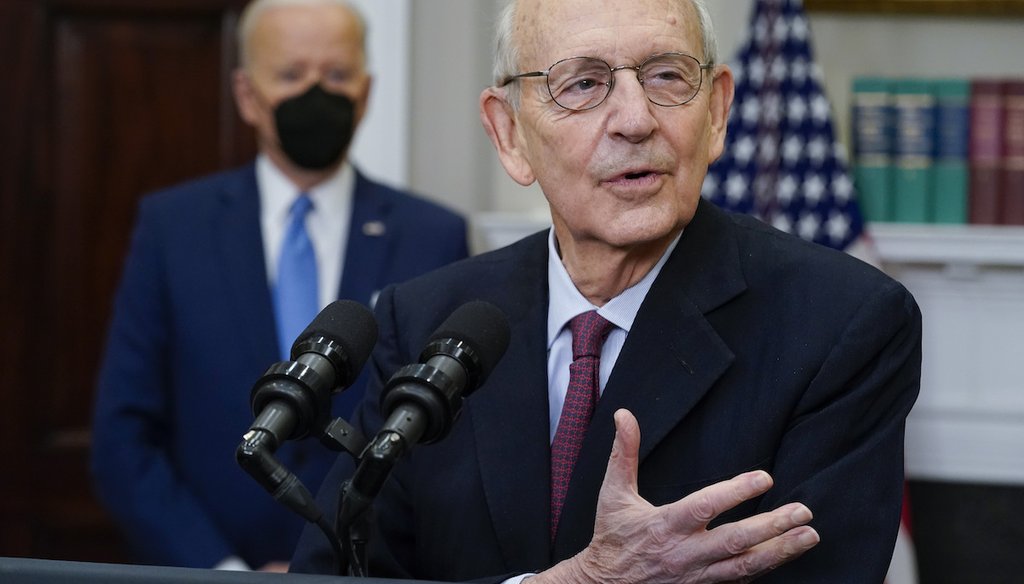

Our only agenda is to publish the truth so you can be an informed participant in democracy.
We need your help.


Supreme Court Justice Stephen Breyer announces his retirement in the White House in Washington Jan. 27, 2022. President Joe Biden looks on. (AP)
After President Joe Biden pledged to nominate a Black woman to the retiring Justice Stephen Breyer’s Supreme Court seat, Sean Hannity said on his radio show that “there’s never been a president that has made race and gender the defining factor.”
President Donald Trump vowed to nominate a woman to the Supreme Court before appointing Justice Amy Coney Barrett in 2020. Ronald Reagan made a similar promise as a candidate to nominate the first woman, then followed through as president. Other presidents have clearly indicated preferences for candidates of specific ethnicities or religions.
Fox News host Sean Hannity misleadingly claimed that President Joe Biden was venturing into unprecedented territory with his pledge to nominate a Black woman as a replacement for U.S. Supreme Court Justice Stephen Breyer, who is retiring after 28 years.
"I'm saying this fully acknowledging that there are definitely qualified people in all backgrounds, all races, all religions, etc., etc.," Hannity said Jan. 27 during a conversation on his radio show. "But there's never been a president that has made race and gender the defining factor. That's the difference here."
Biden, who promised during his campaign to nominate the first Black woman to the nation’s highest court, said he plans to settle on a nominee before the end of February. Only two Black men, the late Justice Thurgood Marshall and Justice Clarence Thomas, and only one woman of color, Justice Sonia Sotomayor, who is Hispanic, have ever served on the Supreme Court.
But Hannity’s claim that Biden did what’s never been done before when he announced his intent to fill Breyer’s seat with a Black woman — a move some conservatives have cast as affirmative action — runs counter to the long history of Supreme Court nominations.
A spokesperson for Hannity’s radio program did not respond to a request for comment.
Less than two years ago, President Donald Trump vowed to nominate a woman to replace the late Justice Ruth Bader Ginsburg. He then appointed Justice Amy Coney Barrett to the vacancy.
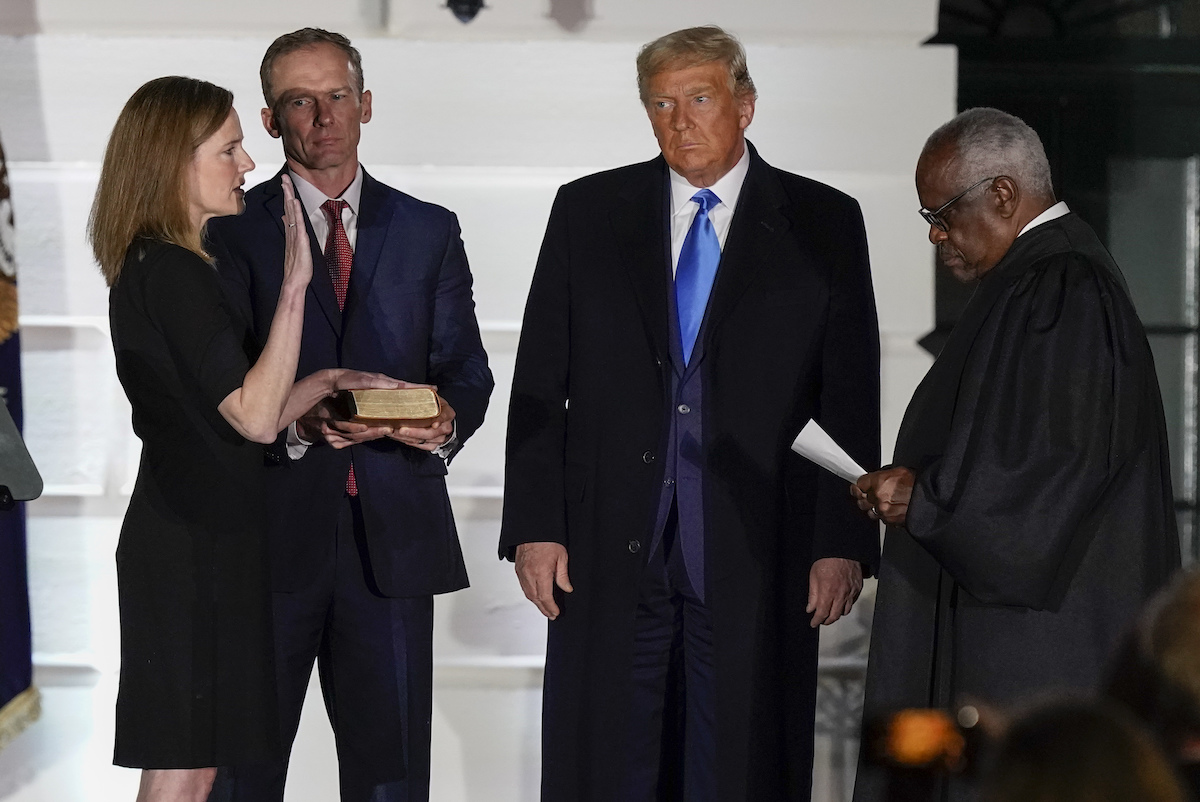
President Donald Trump watches as Supreme Court Justice Clarence Thomas administers the Constitutional Oath to Amy Coney Barrett on Oct. 26, 2020. (AP)
"I will be putting forth a nominee next week. It will be a woman," Trump said Sept. 19, 2020, during a rally in Fayetteville, North Carolina. He later added: "It will be a woman, a very talented, very brilliant woman. I haven’t chosen yet, but we have numerous women on the list."
Decades earlier, President Ronald Reagan said that if he were elected, he would nominate the first woman to the Supreme Court. "It is time for a woman to sit among our highest jurists," he said at a news conference weeks before the 1980 election, according to the Washington Post.
A year later, Reagan followed through, nominating Justice Sandra Day O’Connor.
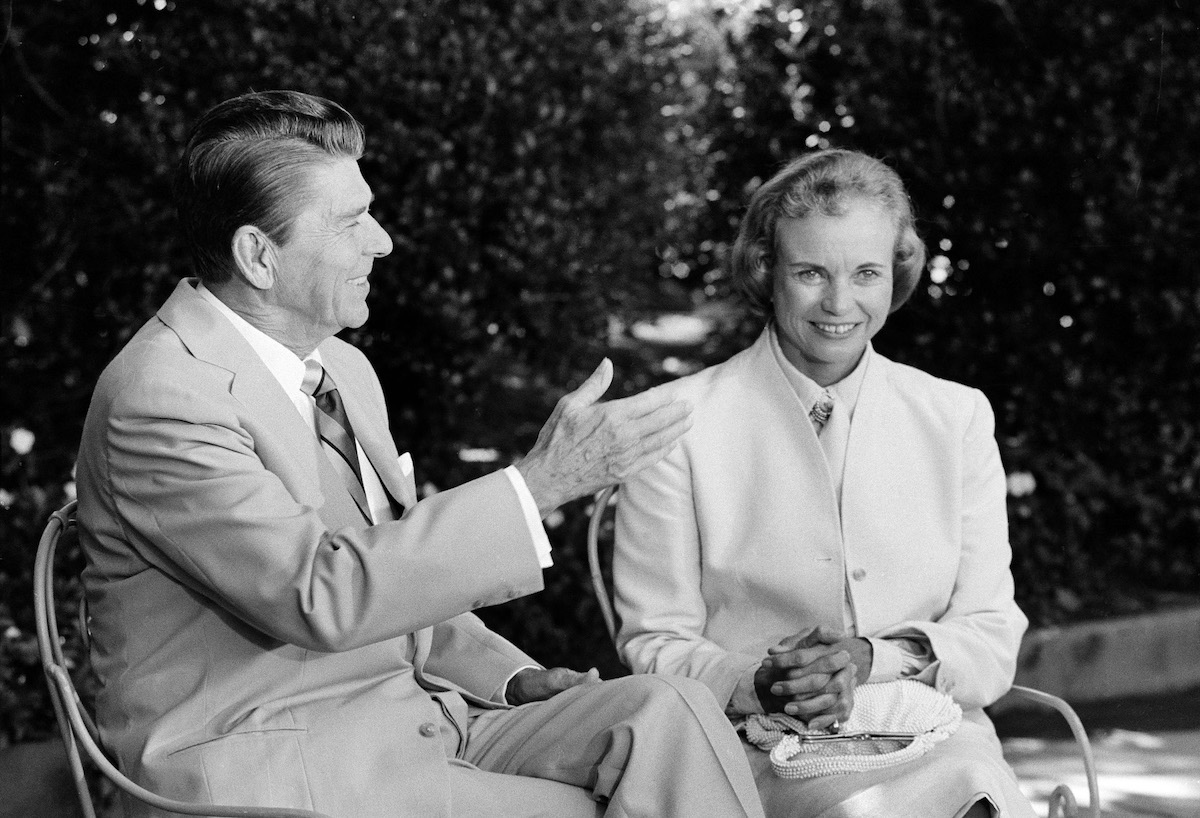
President Ronald Reagan presents his Supreme Court nominee Sandra Day O'Connor to members of the press in the White House Rose Garden on July 15, 1981. (AP)
Race, and also religion, played a role in other Supreme Court nominations, as well.
Nikolas Bowie, assistant professor of law at Harvard Law School, said Hannity’s claim "ignores the reality that from 1789 through 1967, every president made race and gender a defining factor in their selection process by refusing to nominate anyone other than a white man."
Tomiko Brown-Nagin, another professor of constitutional law and history at Harvard University, said the late Justice Antonin Scalia’s Italian background was a "defining, positive factor in Ronald Reagan’s selection of him," citing a report in Slate, a progressive online magazine.
In a 2003 interview with the University of Virginia’s Miller Center, Peter Wallison, Reagan’s White House counsel at the time of Scalia’s appointment in 1986, said that Reagan "wanted to be sure that he could appoint the first Italian-American … he felt that it would be great to put an Italian-American on the Supreme Court."
"Reagan had asked me whether Scalia was of Italian extraction," Wallison said, according to the Miller Center’s interview transcript. "I think he used the word ‘extraction,’ and I said, ‘Yes, he’s of Italian extraction.’ Reagan said, ‘That’s the man I want to nominate, so I want to meet him.’"
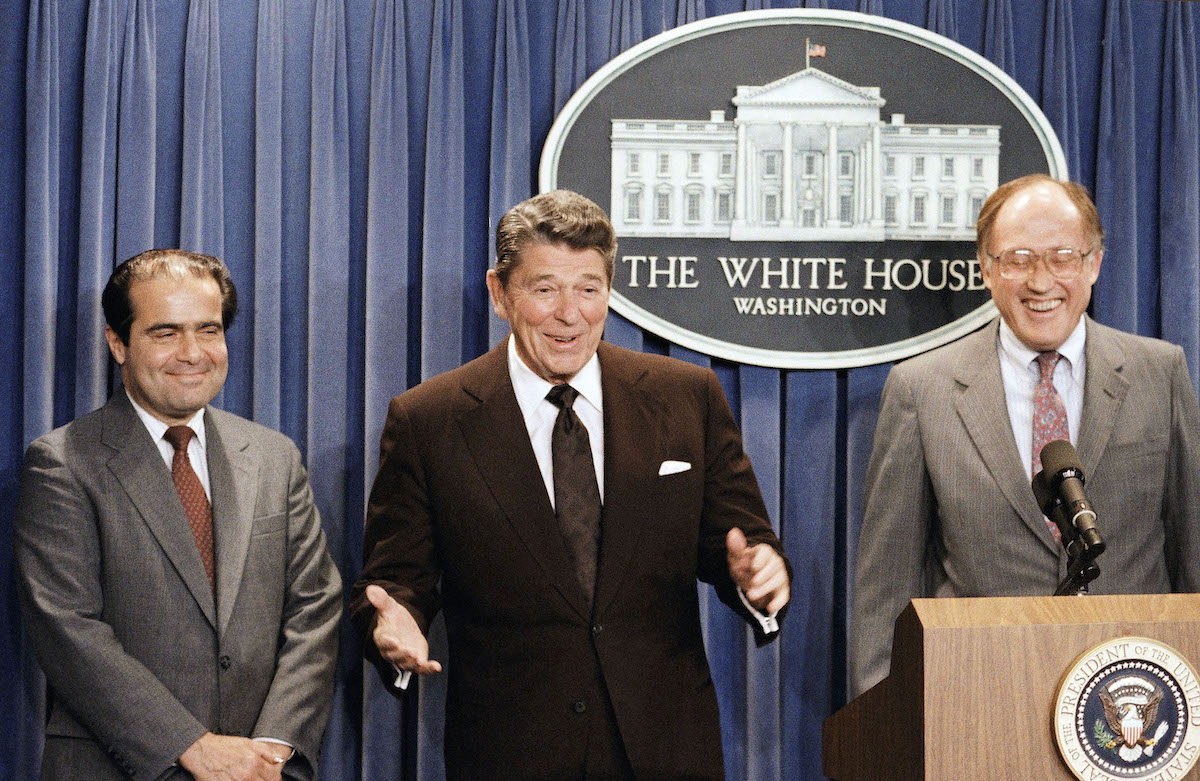
President Ronald Reagan speaks at a news briefing at the White House in Washington, where he announced the nomination of Antonin Scalia to the Supreme Court on June 17, 1986. (AP)
In 1955, President Dwight D. Eisenhower told his attorney general, "I still want the name of some fine, prominent Catholic to nominate to the bench," according to books by historian David A. Nichols, a former professor at Southwestern College, and Sheldon Goldman, a professor of political science at the University of Massachusetts at Amherst.
The late Justice William Brennan Jr., the Catholic whom Eisenhower appointed in 1956, acknowledged this during an interview with Irish America magazine. "I have seen the record that President Eisenhower, when this vacancy arose, gave instructions to the Attorney General that he would like consideration of a Catholic," Brennan said.
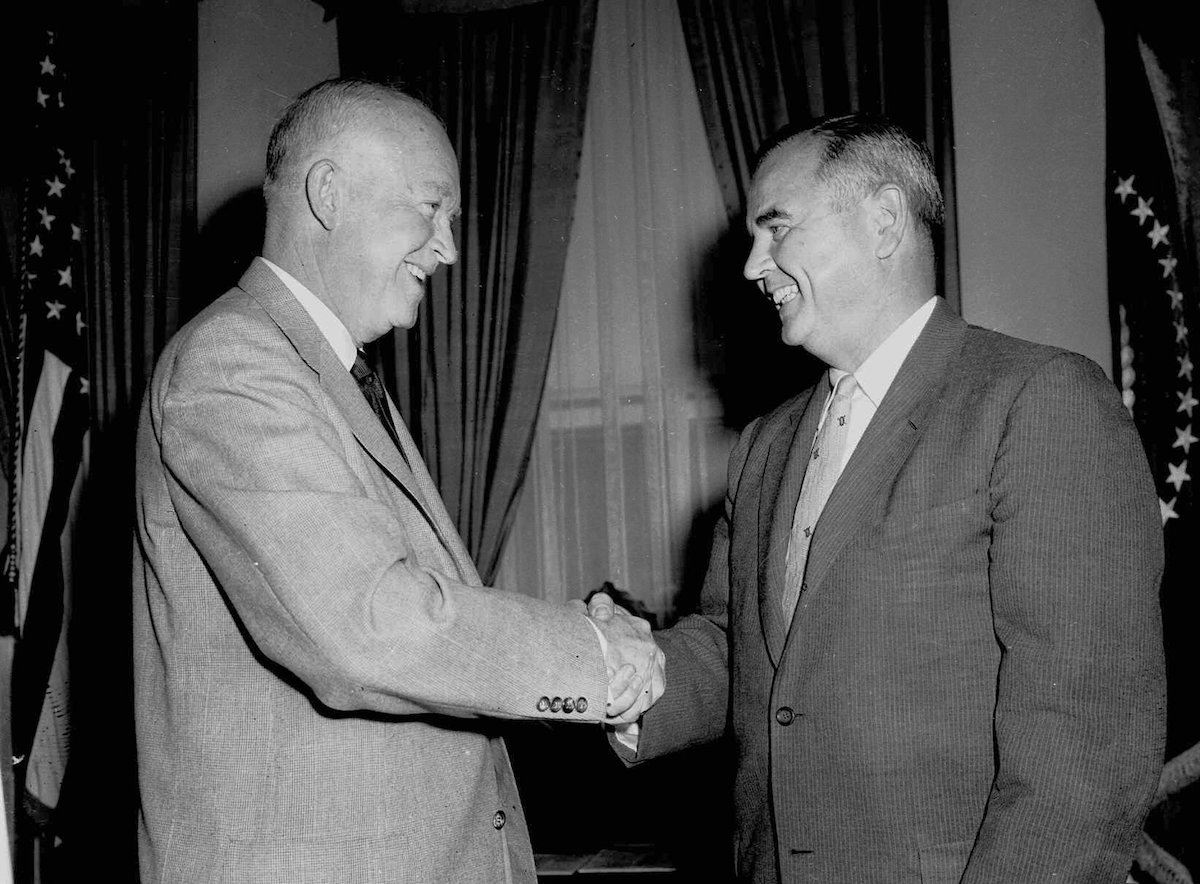
President Dwight D. Eisenhower shakes the hand of Justice William J. Brennan Jr. in the White House on Sept. 29, 1956, after selecting Brennan to the U.S. Supreme Court. (AP)
Contemporary reporting also indicated that President George H. W. Bush concentrated the search that ended with Thomas’ swearing-in in 1991 mostly on minority and female candidates, though Bush denied that he was trying to satisfy a "quota" by replacing one Black justice with another. Thomas replaced Marshall, a former civil rights attorney and the court’s first Black justice, who retired due to health issues.
Hannity said that before Biden’s recent pledge to nominate a Black woman to the Supreme Court, "there's never been a president that has made race and gender the defining factor."
The claim ignored that both Trump and Reagan made similar vows to nominate women to the Supreme Court, then followed through on those promises. Other presidents in history have also considered race and religion as they have made their picks.
We rate Hannity’s claim False.
CORRECTION: A previous version of this fact-check mistakenly named George W. Bush as the president who appointed Justice Clarence Thomas to the Supreme Court. The president who appointed Thomas was George H. W. Bush.
Media Matters for America, "Hannity: Before Biden, ‘there's never been a president that has made race and gender the defining factor’ in SCOTUS nominations," Jan. 27, 2022
Sheldon Goldman, "Picking Federal Judges: Lower Court Selection from Roosevelt Through Reagan," accessed Jan. 28, 2022
David A. Nichols, "A Matter of Justice: Eisenhower and the Beginning of the Civil Rights Revolution," accessed Jan. 28, 2022
The Washington Post, "The very selective effort to cast Biden’s Supreme Court pick as an affirmative action hire," Jan. 27, 2022
The New York Times, "Biden is not the first president to promise to select his nominee from a specific demographic group," Jan. 27, 2022
Slate, "Did You Know Reagan Picked Scalia for the Supreme Court Because He Was Italian?" Jan. 27, 2022
Factba.se on YouTube, "Speech: Donald Trump Holds a Campaign Rally in Fayetteville, North Carolina - September 19, 2020," Sept. 19, 2020
The New Yorker, "Ike, Ford, and a Lost Voice in Supreme Court Nominations," Feb. 16, 2016
University of Virginia Miller Center, "Peter Wallison Oral History," Oct. 28, 2003
The Washington Post, "Buch Picks Thomas for Supreme Court," July 2, 1991
The New York Times, "The Supreme Court: Conservative Black Judge, Clarence Thomas, is Named to Marshall’s Court Seat," July 2, 1991
Irish America, "LONE JUSTICE: An Interview with Justice William Brennan, Jr.," 1990
Email interview with Nikolas Bowie, assistant professor of law at Harvard Law School, Jan. 28, 2022
Email interview with Tomiko Brown-Nagin, professor of constitutional law at Harvard Law School and professor of history at Harvard University, Jan. 28, 2022
In a world of wild talk and fake news, help us stand up for the facts.
